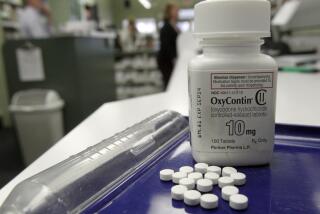FDA approves Lucemyra to treat symptoms of opioid withdrawal and help patients overcome addiction
The battle against opioid addiction in the United States got a new weapon Wednesday, in the form of a pill to help patients manage symptoms of withdrawal.
The Food and Drug Administration said it gave its seal of approval to Lucemyra, a medication that has been used to treat opioid withdrawal in the United Kingdom for more than two decades.
Lucemyra is not itself a treatment for opioid use disorder, the FDA said in its announcement. But in clinical trials, it was shown to reduce the severity of the withdrawal symptoms that patients experience when they stop taking opioids cold turkey.
By easing the side effects of withdrawal, people struggling with opioid addiction may have a better chance of kicking the habit.
“The physical symptoms of opioid withdrawal can be one of the biggest barriers for patients seeking help and ultimately overcoming addiction,” said Dr. Scot Gottlieb, the FDA’s commissioner. “The fear of experiencing withdrawal symptoms often prevents those suffering from opioid addiction from seeking help. And those who seek assistance may relapse due to continued withdrawal symptoms.”
Most patients who take opioid painkillers with a doctor’s prescription can manage their withdrawal symptoms by slowly tapering their dose, giving their body a chance to adjust.
But when people have become addicted to opioids, going without the drugs can be an uncomfortable and painful experience. In as little as a few hours, patients may experience stomach cramps, muscle aches and spasms, a pounding heart, nausea, vomiting and diarrhea. Other symptoms include anxiety, agitation, depression and insomnia.
“Withdrawal is notoriously hard to endure for people addicted to opioids,” Dr. Nora Volkow, director of the National Institute on Drug Abuse, wrote on her blog. “Approval of the first medication to treat the physical symptoms of opioid withdrawal is a major milestone, one that could improve the lives and treatment success of thousands of people living with opioid addiction.”
Lucemyra, also known as lofexidine hydrochloride, was originally intended to be a hypertension medication. It acts to reduce the release of norepinephrine, a hormone that increases heart rate and blood pressure.
Norepinephrine is also a neurotransmitter, and scientists believe it is implicated in many symptoms of opioid withdrawal. Patients in the U.K. have been using it to reduce these symptoms since the early 1990s, according to the FDA.
In clinical trials involving 866 adults with opioid dependence, those who were randomly assigned to take Lucemyra reported less severe withdrawal symptoms than people who were randomly assigned to take a placebo. Neither the patients nor their doctors knew whether they were taking the real drug or a dummy pill.
In addition, patients who got Lucemyra were more likely to complete the course of treatment, which can last for up to 14 days.
The drug’s most common side effects included low blood pressure, slow heart rate, sleepiness, sedation and dizziness. The trials were funded in part by NIDA.
The FDA is requiring 15 additional studies to further assess the drug’s safety when used in children, for longer than 14 days, and in other situations that were not tested in the earlier trials.
The drug will be available here in the summer, the FDA said. It will be sold by US WorldMeds.
Follow me on Twitter @LATkarenkaplan and “like” Los Angeles Times Science & Health on Facebook.
MORE IN SCIENCE
Health officials launch ambitious plan to rid the world of trans fats
Melania Trump had an embolization to treat a kidney condition. What is an embolization?
Computers crack the code of pop-song success: It helps to be ‘happy’ and ‘female’







